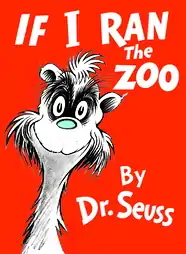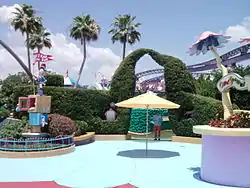If I Ran the Zoo
If I Ran the Zoo is a children's book written by Dr. Seuss in 1950.
 | |
| Author | Dr. Seuss |
|---|---|
| Original title | If I Got to the Zoo |
| Country | United States |
| Language | English |
| Genre | Children's literature |
| Publisher | Redbook (magazine) Random House (book) |
Publication date | 1950 (renewed 1977) |
| Media type | Print (Hardcover) |
| Pages | 40 |
| ISBN | 978-0-394-80081-3 |
| OCLC | 470411 |
| Preceded by | Bartholomew and the Oobleck |
| Followed by | Scrambled Eggs Super! |
The book is written in anapestic tetrameter, Seuss's usual verse type, and illustrated in Seuss's pen-and-ink style.
Plot
It tells the story of a child named Gerald McGrew who, when visiting a zoo, finds that the exotic animals are "not good enough". He says that if he ran the zoo, he would let all of the current animals free and find new, more bizarre and exotic ones. Throughout the book he lists these creatures, starting with a lion with ten feet and escalating to more imaginative (and imaginary) creatures, such as the Fizza-ma-Wizza-ma-Dill, "the world's biggest bird from the island of Gwark, who eats only pine trees, and spits out the bark."
The illustrations also grow wilder as McGrew imagines going to increasingly remote and exotic habitats and capturing each fanciful creature, bringing them all back to a zoo now filled with his new wild animals. He also imagines the praise he receives from others, who are amazed at his "new Zoo, McGrew Zoo".
Adaptation
Some of the animals featured in If I Ran the Zoo have been featured in a segment of The Hoober-Bloob Highway, a 1975 CBS TV special. In this segment, Hoober-Bloob babies don't have to be human if they don't choose to be, so Mr. Hoober-Bloob shows them a variety of different animals; including ones from If I Ran The Zoo (and On Beyond Zebra!). Such animals include: Obsks, a flock of Wild Bippo-No-Bungus, a Tizzle-Topped Tufted Mazurka, a Big-Bug-Who-Is-Very-Surprising, Chuggs, a Deer with Horns-That-Are-Just-A-Bit-Queer, a New Sort-Of-A-Hen, an Elephant-Cat, and an Iota.
"Nerd"
If I Ran the Zoo is often credited[1][2] with the first printed modern English appearance of the word "nerd," although the word is not used in its modern context. It is simply the name of an otherwise un-characterized imaginary creature, appearing in the sentence "And then, just to show them, I'll sail to Ka-Troo/And Bring Back an It-Kutch, a Preep, and a Proo,/A Nerkle, a Nerd, and a Seersucker too!"
Theme park attraction
| If I Ran the Zoo | |
|---|---|
 Entrance | |
| Islands of Adventure | |
| Area | Seuss Landing |
| Soft opening date | March, 1999 |
| Opening date | May 28, 1999 |
| General statistics | |
| Attraction type | Play Area |
| Theme | If I Ran the Zoo |
Dr. Seuss's Zoo book is also the main theme for one of the children's play areas at Universal Studios' Islands of Adventure. The small play area is located inside the area of the park known as Seuss Landing.
Criticism
If I Ran the Zoo has been criticized for its use of racial stereotypes and caricatures. In a 1988 biography of Dr. Seuss, Ruth K. MacDonald notes the presence of “occasional stereotypes of native peoples—potbellied, thick-lipped blacks from Africa, squinty-eyed Orientals,” that “may offend some modern readers.”[3] A study published in the journal Research on Diversity in Youth Literature noted the presence of dehumanizing stereotypes of East Asian and Middle Eastern characters.[4] The Canadian Book and Periodical Council's Freedom to Read project listed the book as having been challenged in 2015 for “insensitivity and ethnic stereotyping.”[5]
See also
References
- David Brooks (2008-05-23). "The Alpha Geeks". New York Times.
- Eryn Loeb (2008-05-20). "The beauty of the geek". Salon.com.
- MacDonald, Ruth K. (1988). Dr. Seuss. Boston: Twayne Publishers. p. 71. ISBN 0-8057-7524-2. OCLC 18014535.
- Ishizuka, Katie; Stephens*, Ramón (2019-02-13). "The Cat is Out of the Bag: Orientalism, Anti-Blackness, and White Supremacy in Dr. Seuss's Children's Books". Research on Diversity in Youth Literature. 1 (2).
- "If I Ran the Zoo". www.freedomtoread.ca. Retrieved 2019-12-16.